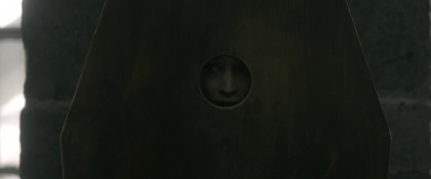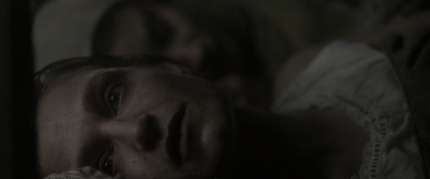CBC’s Alias Grace
Part 1
Directed by Mary Harron
Written by Sarah Polley
* For a recap & review of Part 2, click here.
We begin on Grace Marks (Sarah Gadon), speaking about herself through the perspectives of others, as she looks at herself in the mirror. Reeling off the various things people have called her, from “soft in the head” to “an inhuman female demon” among many other names.
“How can I be all these different things at once?”
1859, at Kingston Penitentiary. Grace has been there fifteen years. She goes to the Governor’s House, meant as a housekeeper. Although she believes it’s her status as a murderess which fascinates people, they want her around. We see various edits of madness, murder, letters. Now, Dr. Simon Jordan (Edward Holcroft) is coming to see Grace in her cell, to see if he can get to the bottom of her case, her mind.
When Dr. Jordan arrives he sees the dichotomy of identity surrounding Grace Marks, that she’s at once apparently the cold-blooded murderess who killed two people, she’s likewise a meek woman, afraid of doctors, one who can appreciate the smell of a fresh apple. This begins a relationship between the two, as he’s there to delve into her psychology; of course this is before psychology meant talking with a therapist, mostly patients being strapped down in asylums, abused mentally and physically. One major reason why Grace is so reluctant to get into conversation with Dr. Jordan.
The doctor begins digging into the trial, about Grace’s claim of seeing James McDermott (Kerr Logan) tossing Nancy Montgomery (Anna Paquin) into the cellar. He speaks with the Reverend (David Cronenberg) about her, those claims, McDermott’s claim concerning what Grace had done. The Reverend’s only concerned with getting the young woman pardoned, out of that hideous jail. Now, the doc is arranging to try getting Grace back into the Governor’s house, after the fit she threw when a doctor tried measuring her head, so that they might meet outside the jail. This doesn’t particularly help the woman, making other prisoners and the jailers believe she’s seducing the doctor, surely to kill him like she’s done already. Poor Grace, indicted in the media, let alone the courts. Her reputation precedes her, when much of it might not even be true.
Note: The quilt was a great device in the novel, marking the chapters, taking us into the story on a whole other level. Margaret Atwood’s writing shines through even in this adaptation; she is a wholly unique writer, why she’s a literary treasure in Canada.
As Dr. Jordan takes a crack at opening the secrets kept in Grace’s mind, the viewer is offered the other side, seeing what she’s thinking while she gives her answers to him. Some of what we see appears to be what she’s thinking; other times her answers differ greatly from what she’s TRULY thinking.
“Saying what you really want brings bad luck”
 Grace takes the doctor back through her past, coming from Northern Ireland as a Protestant family, poor, driven out by Catholic violence. We see them mistreated, looked down upon simply for being Irish, and with an English father no less. They took a boat across the ocean. A rough journey below deck, as people vomit, pass out drunk, fight, shit, all the while dealing with storms, rats, scurvy, and worse. Grace compared her journey in that “slum in motion” to Jonah in the belly of that great whale, who had it easy by himself, rather than stuffed together with tons of others in those wretched conditions. Worse, her mother was ill and getting sicker all the time. Until one morning Grace woke next to her cold corpse.
Grace takes the doctor back through her past, coming from Northern Ireland as a Protestant family, poor, driven out by Catholic violence. We see them mistreated, looked down upon simply for being Irish, and with an English father no less. They took a boat across the ocean. A rough journey below deck, as people vomit, pass out drunk, fight, shit, all the while dealing with storms, rats, scurvy, and worse. Grace compared her journey in that “slum in motion” to Jonah in the belly of that great whale, who had it easy by himself, rather than stuffed together with tons of others in those wretched conditions. Worse, her mother was ill and getting sicker all the time. Until one morning Grace woke next to her cold corpse.The hardest part for her was the old wives tale that the spirit couldn’t be free if a window wasn’t opened for it to escape, something that obviously was foregone under the deck of a ship on the Atlantic. But she survived the remainder of the journey to Toronto, where she and her family saw the mix of culture already pouring in from the ports.
Things were no better when they settled in. Grace’s father called her terrible things, beat her unconscious. He did worse than that, as well, lusting after his own daughter like a lecherous old drunk. Life, in general, for Grace meant survival. She actually showed great restraint in not murdering her disgusting father.
 Soon enough, Grace was kicked out of the house, made to make a wage; not just that, her father expected her to sent money back home. So, she packed the few little things she owned and left by herself. Out into the unknown of Toronto in the mid-1800s. She found herself work as a housekeeper for the Parkinsons, where she first met Mary Whitney (Rebecca Liddiard), the two fast becoming close friends. Mary tells her all about the rebellion “against the gentry.” This has been causing plenty of chaos, in public and private.
Soon enough, Grace was kicked out of the house, made to make a wage; not just that, her father expected her to sent money back home. So, she packed the few little things she owned and left by herself. Out into the unknown of Toronto in the mid-1800s. She found herself work as a housekeeper for the Parkinsons, where she first met Mary Whitney (Rebecca Liddiard), the two fast becoming close friends. Mary tells her all about the rebellion “against the gentry.” This has been causing plenty of chaos, in public and private.Mary: “The difference between ignorant and stupid is that ignorant can learn”
After Grace’s talk with the doctor, she must return to life at the penitentiary, quilting by night in candlelight. Left with her memories of the trial, of all that’s happened. She talks about the media, how everything that she said was “twisted around” by the papers, no matter if it were truth. And this is all leading her to an epiphany, about how she’s perceived, how she can mould that perception, or at least try to, anyways. She also understands how the media, the rumours, all of it can tear a person apart, and in a sense harden them.
 Beautiful opener! This is my personal favourite Margaret Atwood book, so to see it as a miniseries, and looking so good out of the gate, I’m tickled. Hope to see more of the excellent characterisation in the next episode, Grace Marks is a tricky character. Even Atwood’s chaged her view on the woman over time. So, bring on more good writing, more intensity, lots of drama.
Beautiful opener! This is my personal favourite Margaret Atwood book, so to see it as a miniseries, and looking so good out of the gate, I’m tickled. Hope to see more of the excellent characterisation in the next episode, Grace Marks is a tricky character. Even Atwood’s chaged her view on the woman over time. So, bring on more good writing, more intensity, lots of drama.Part 2 comes next.






